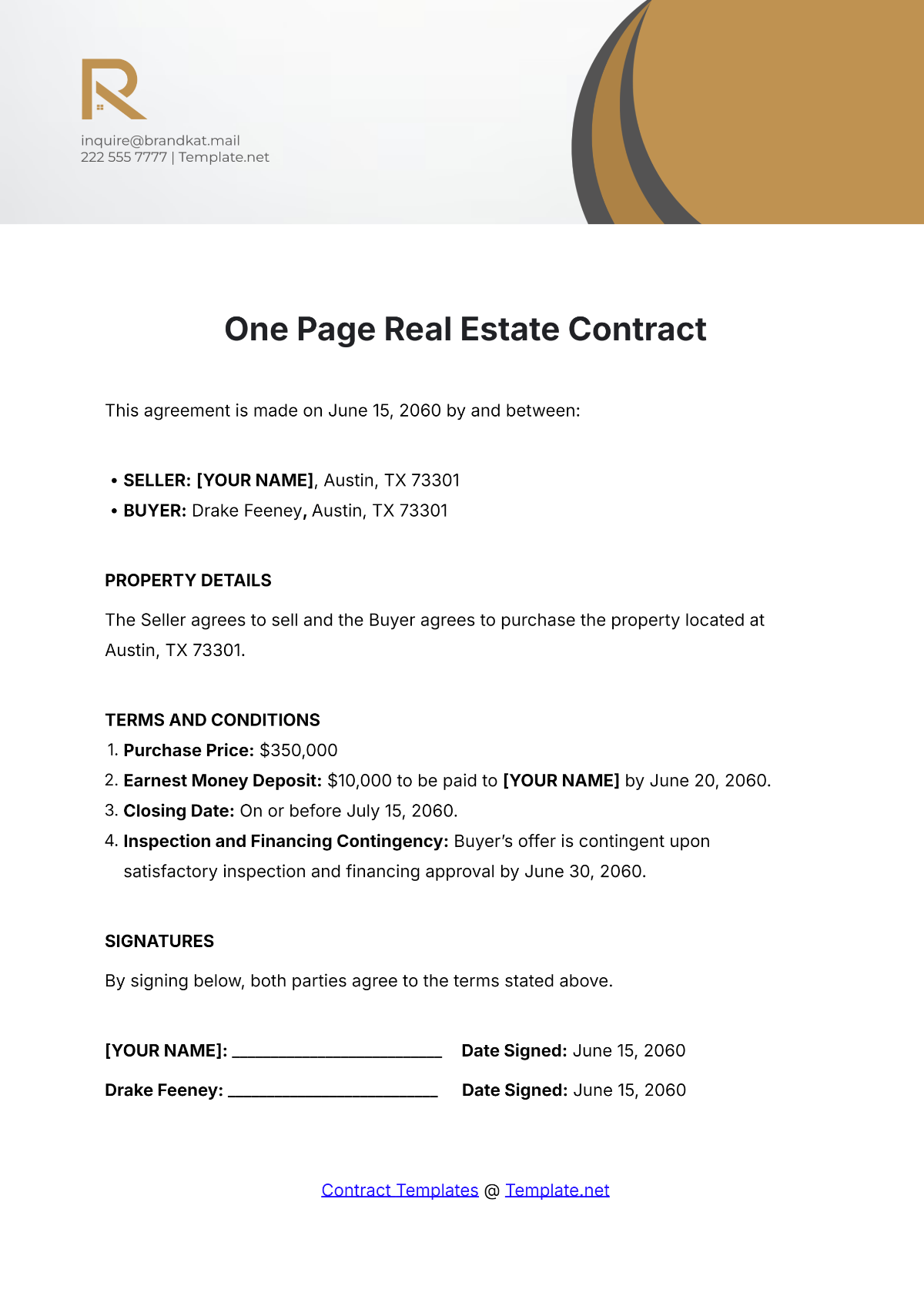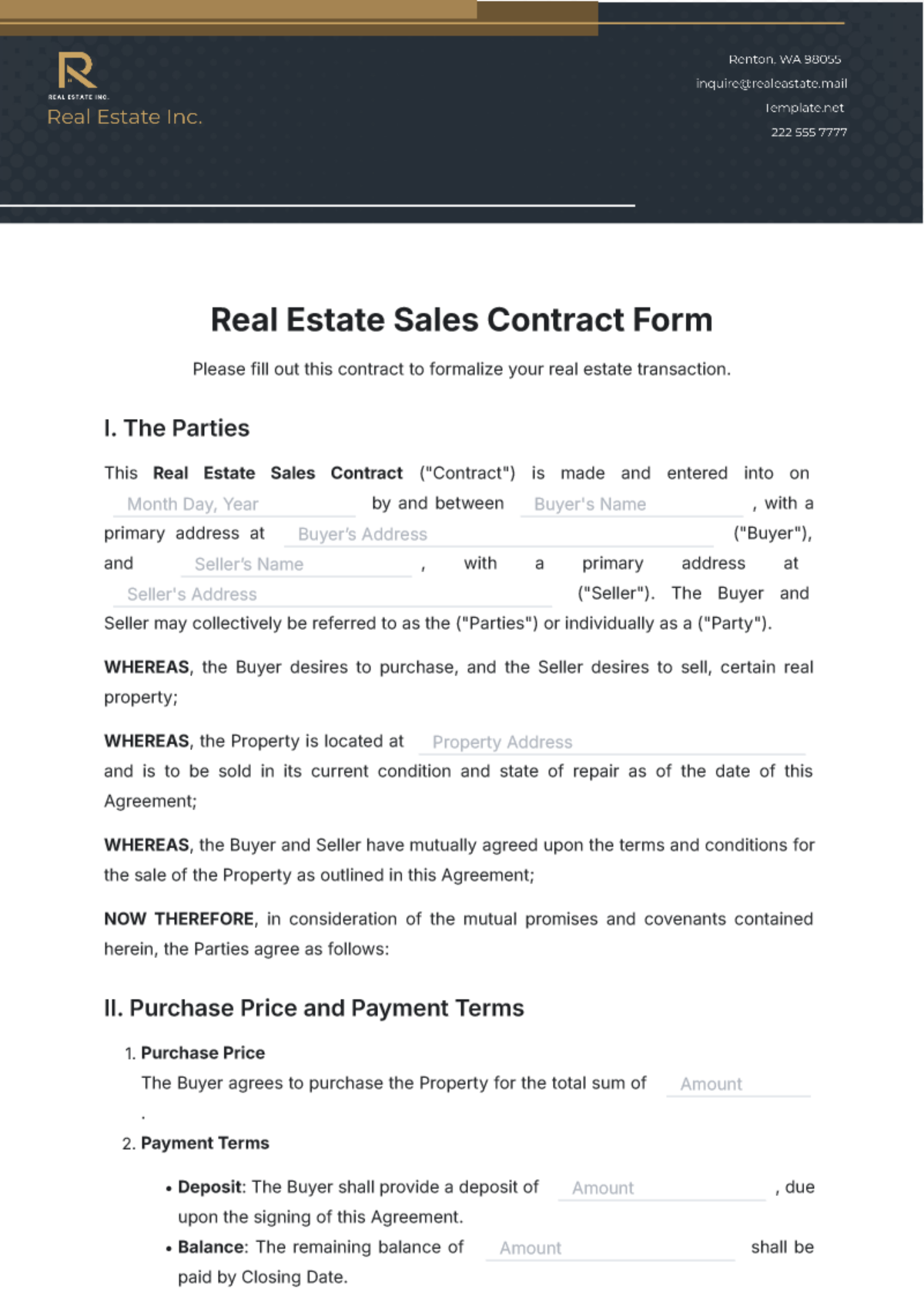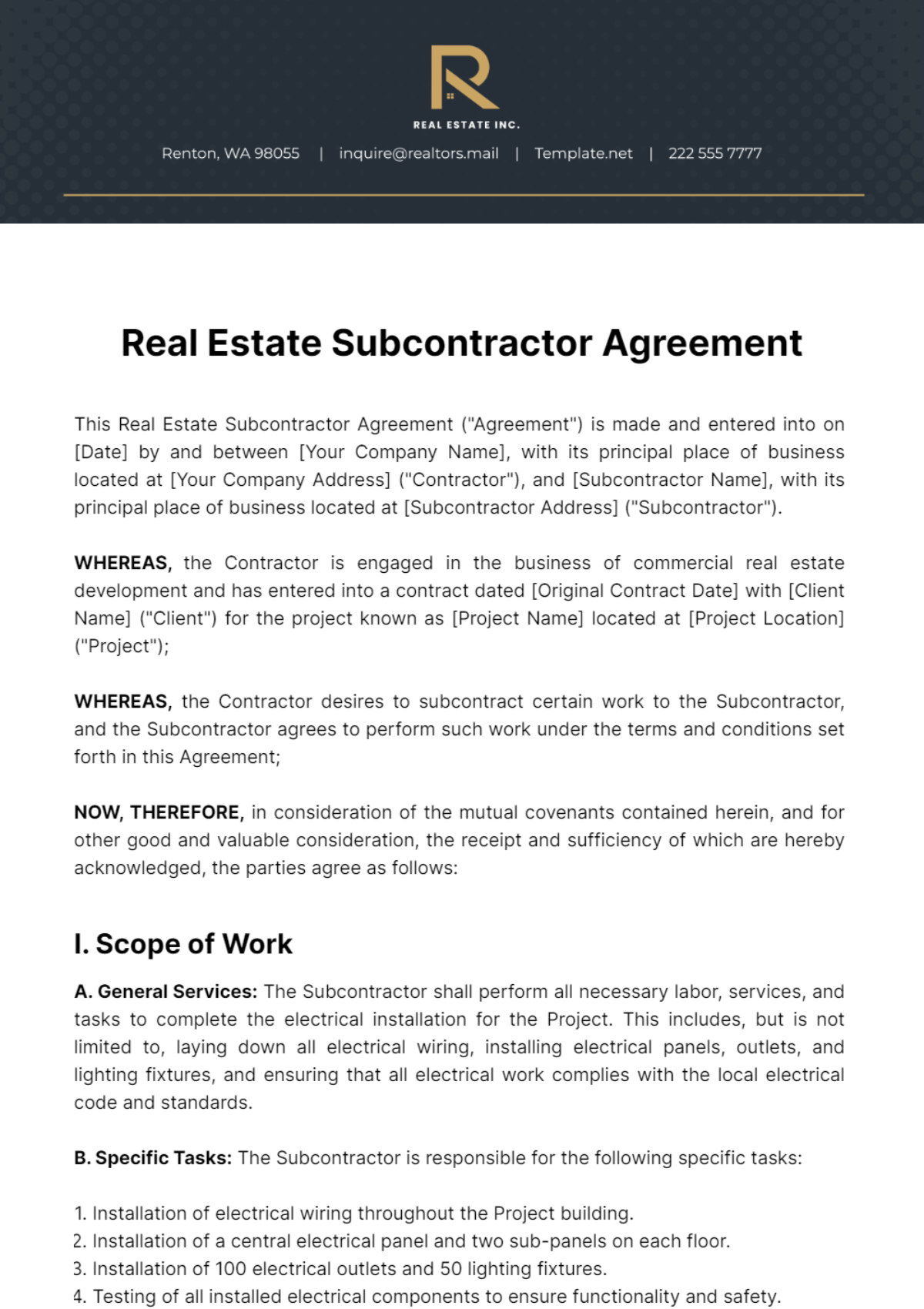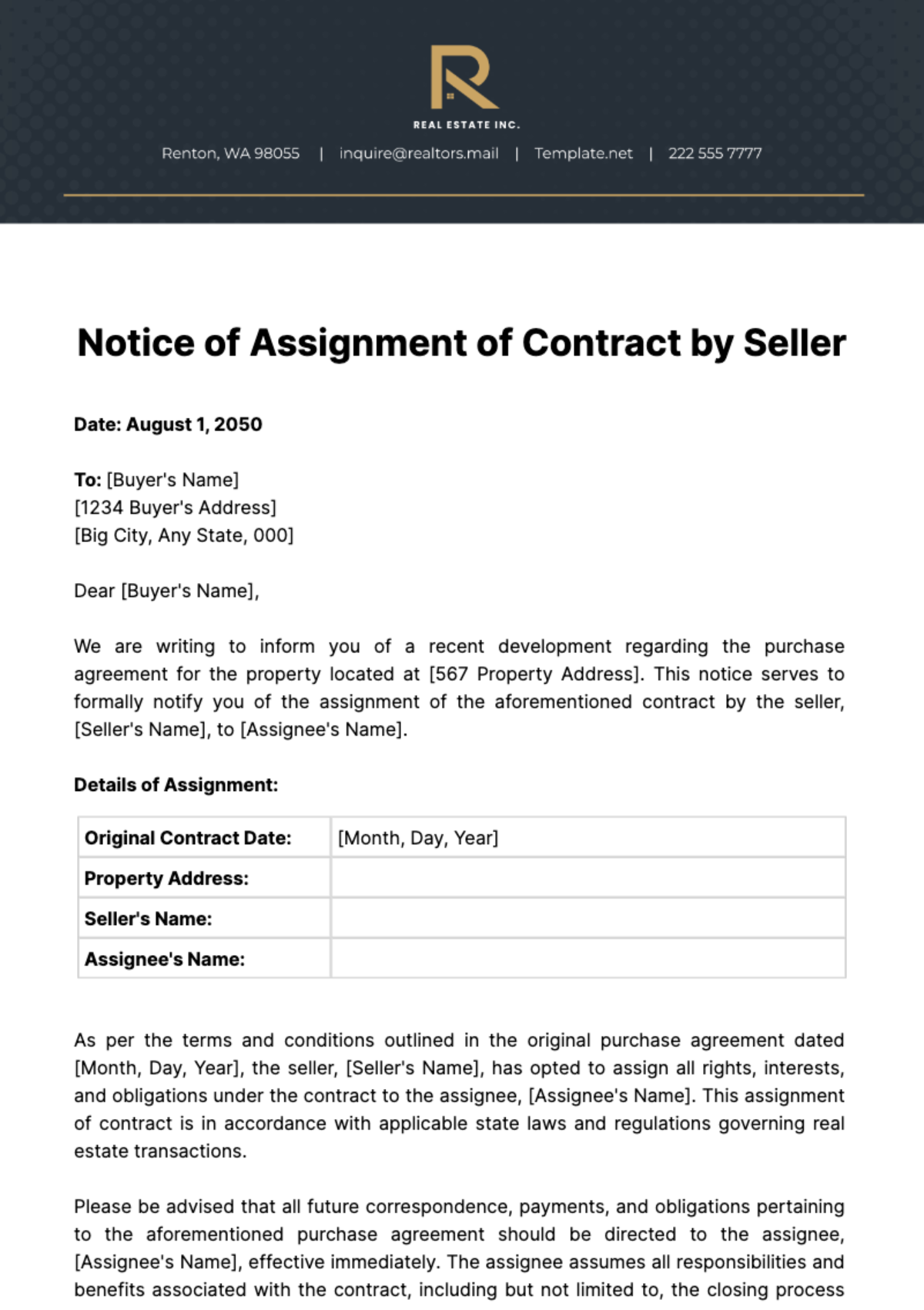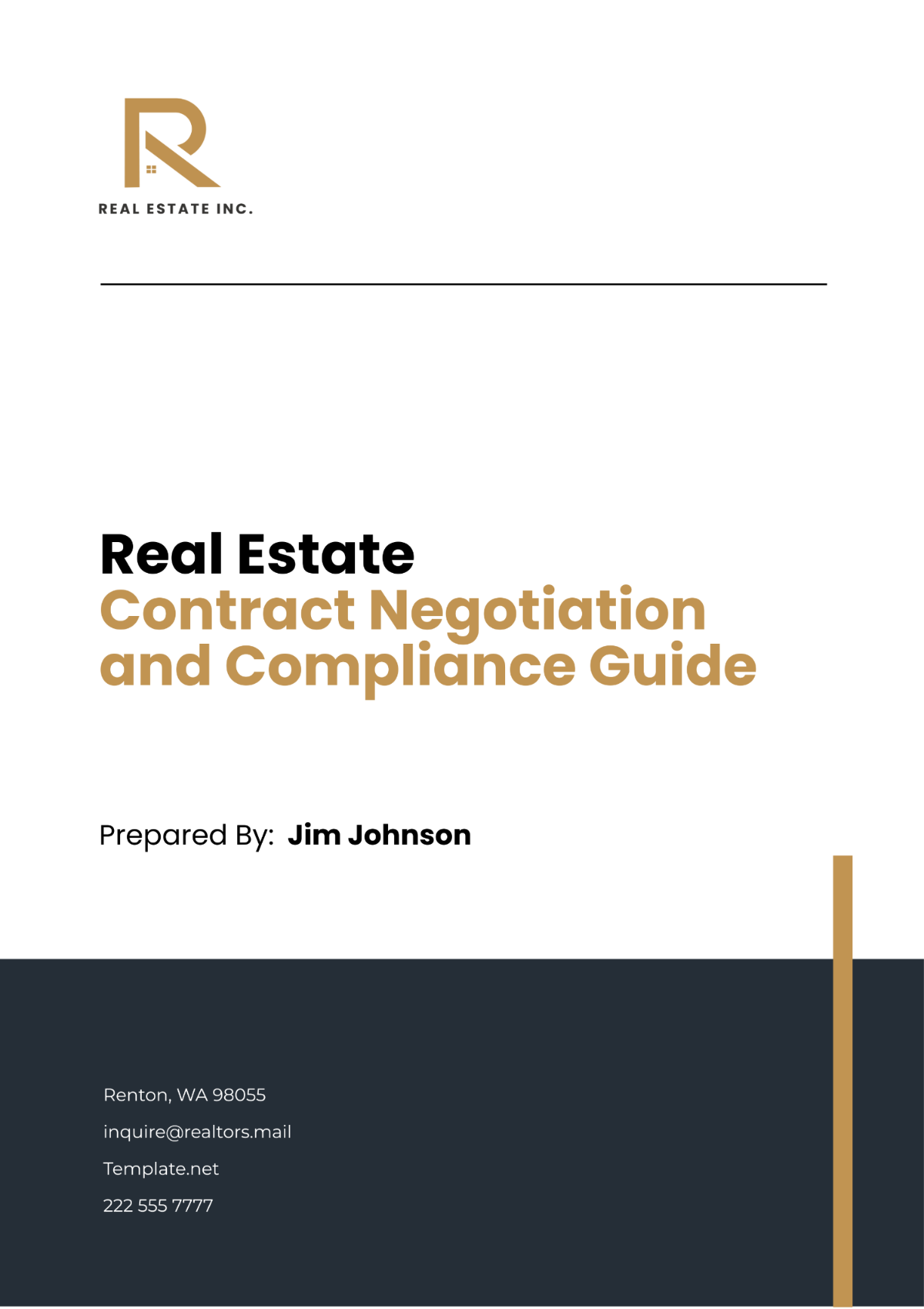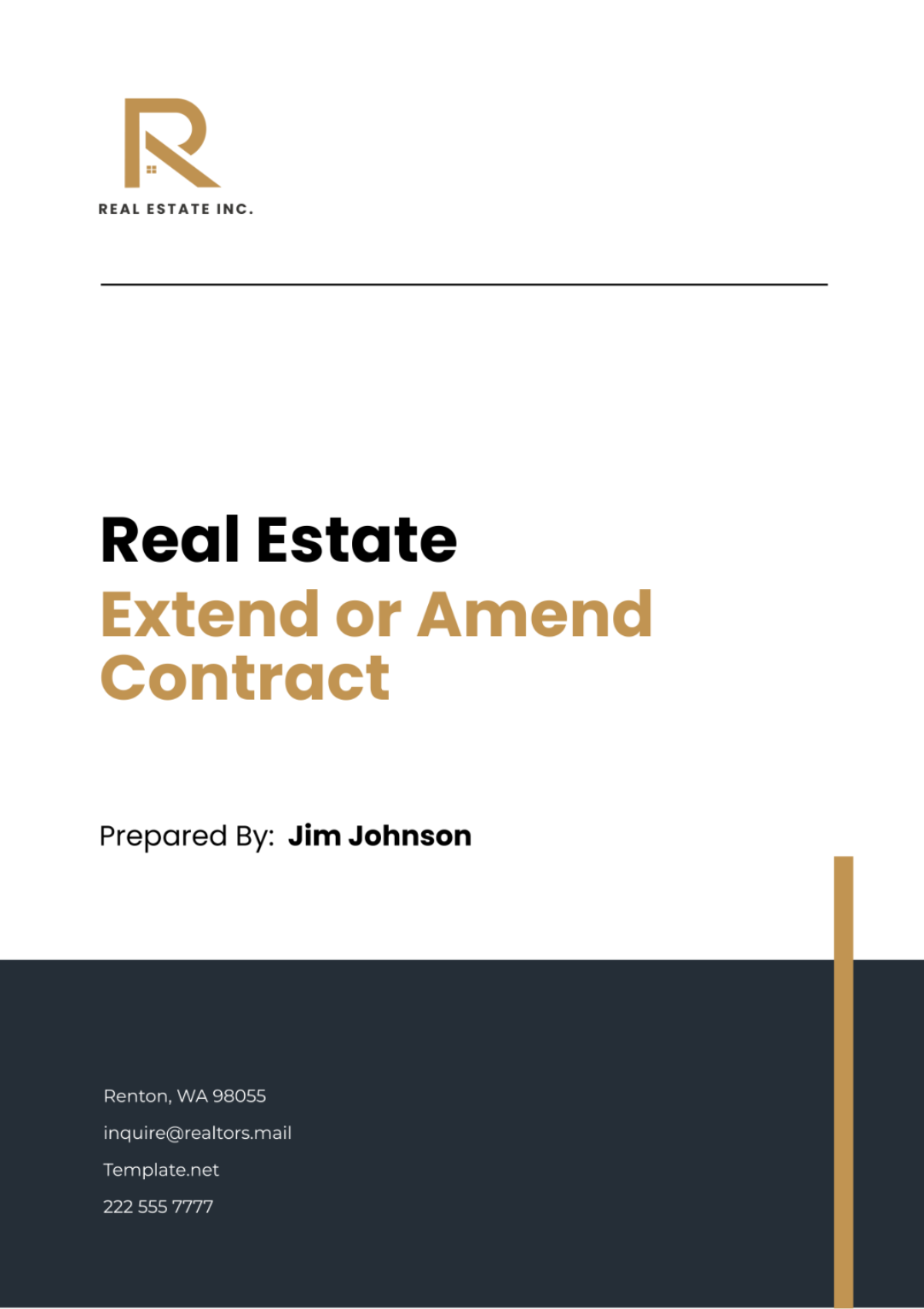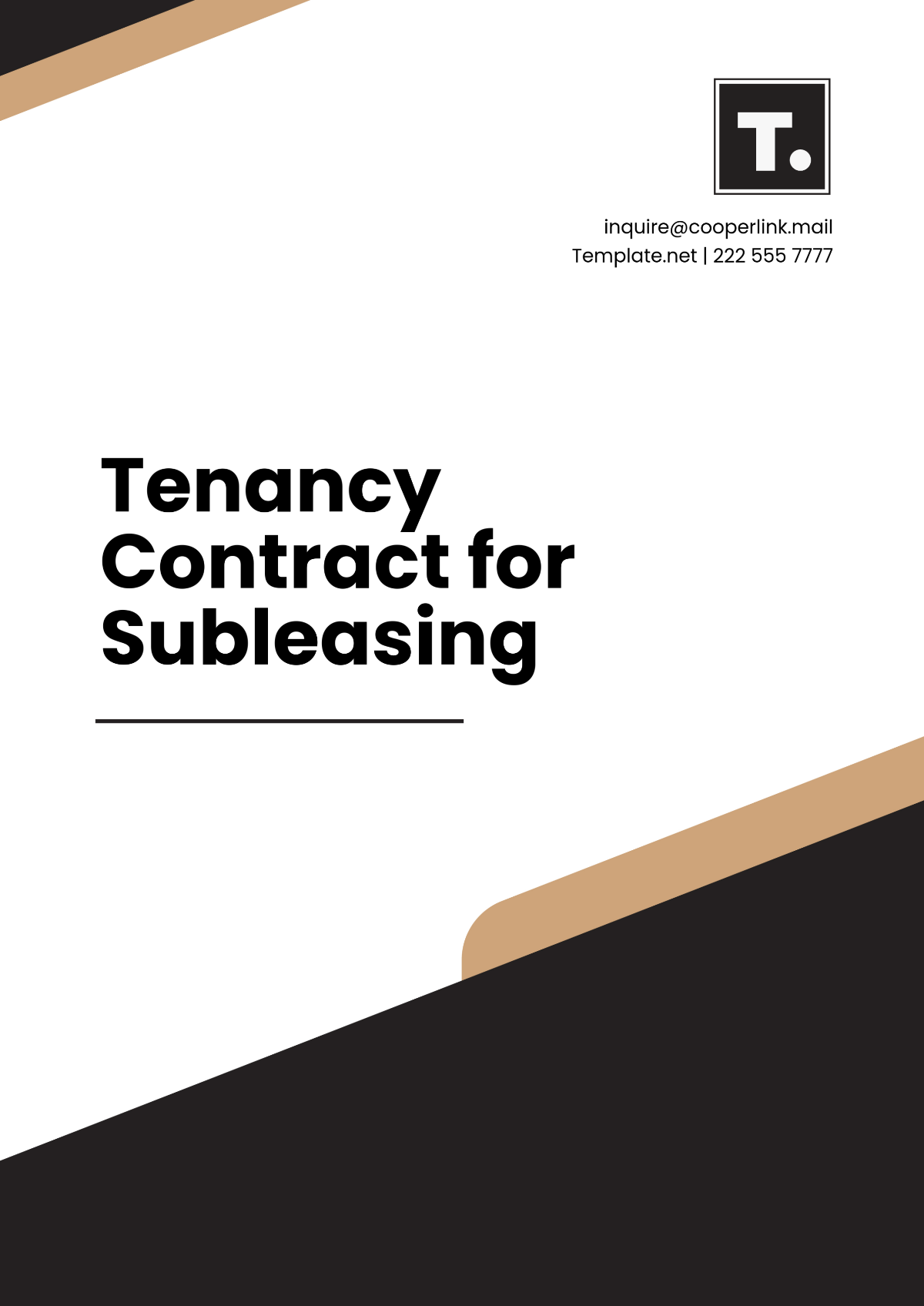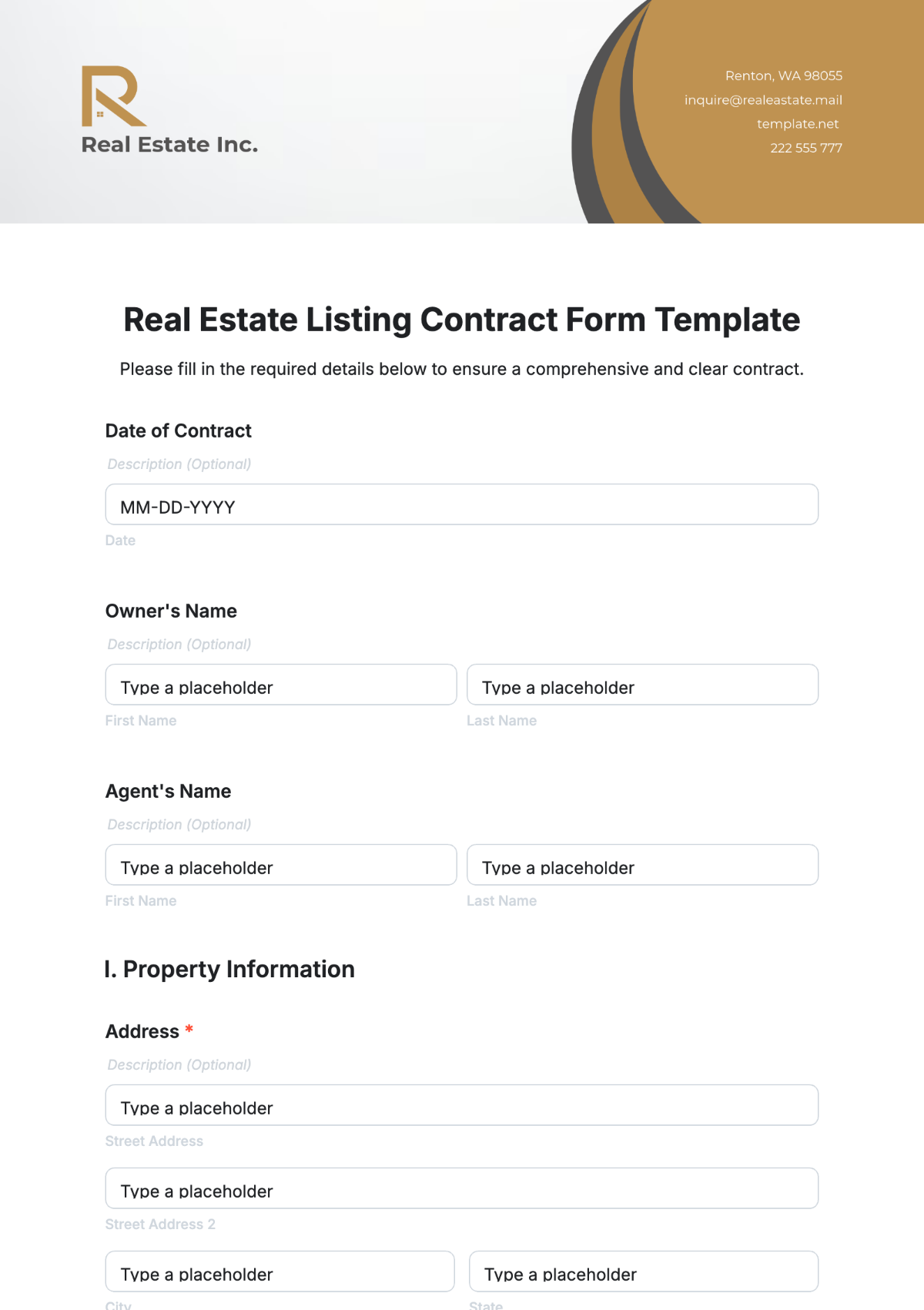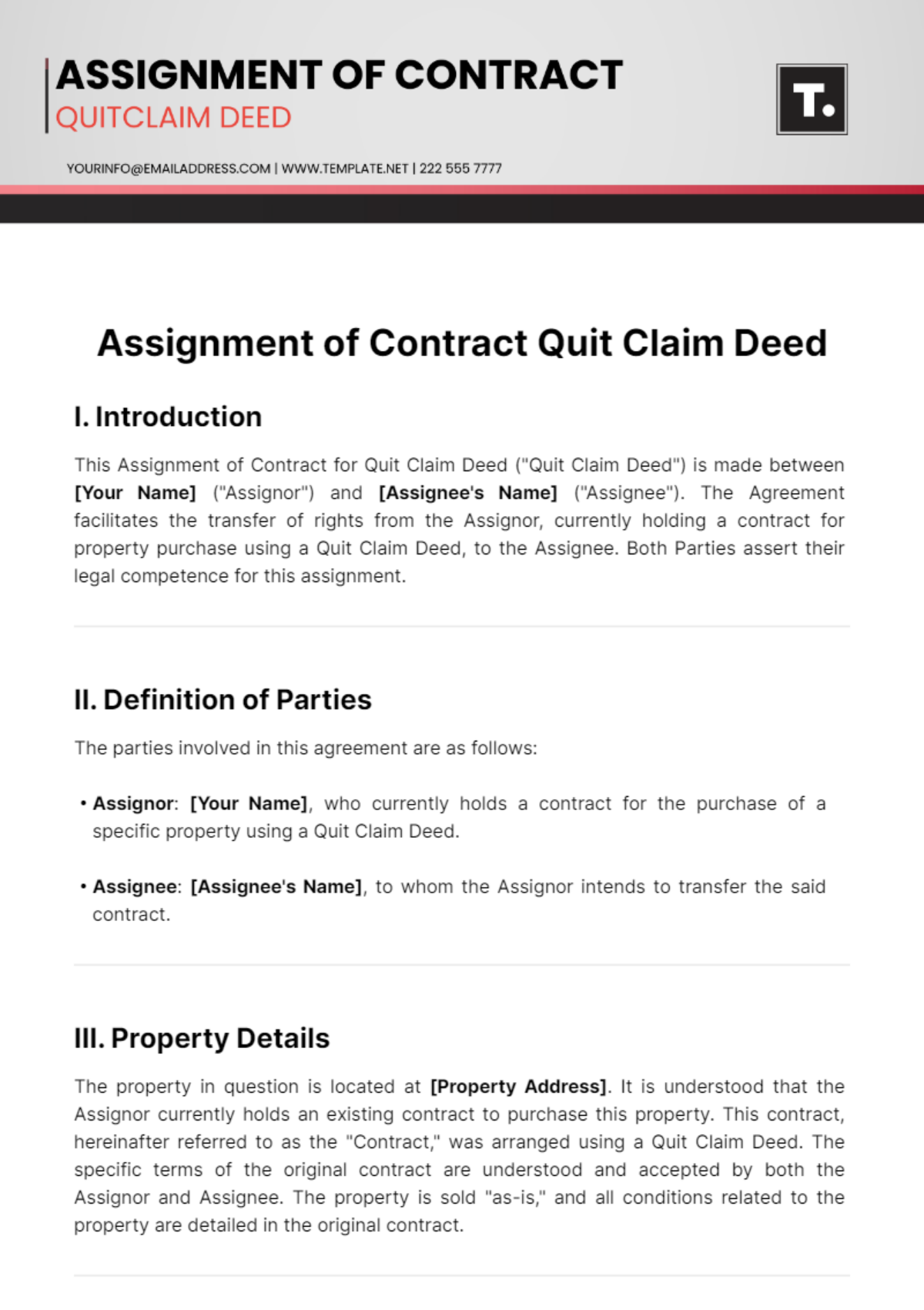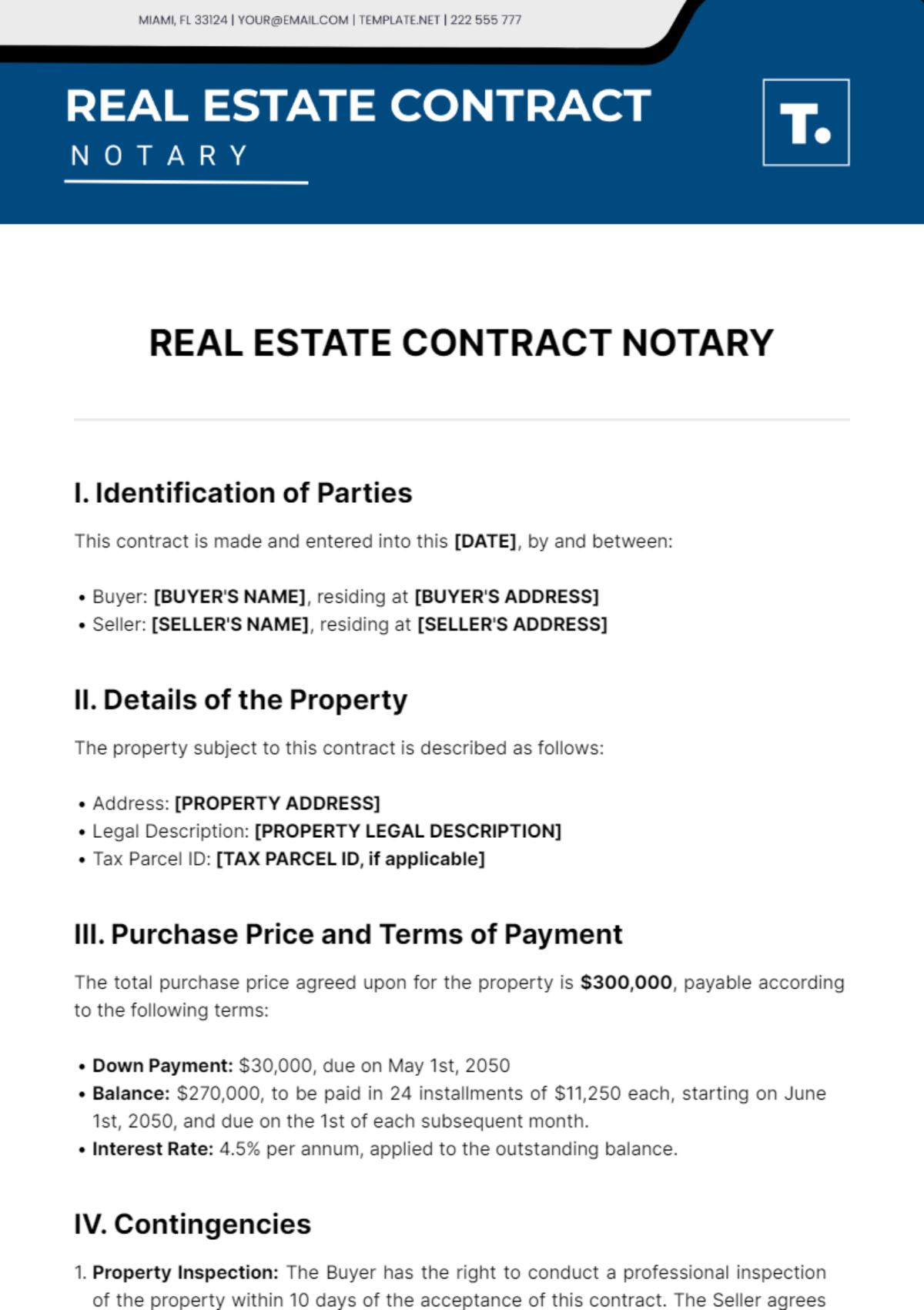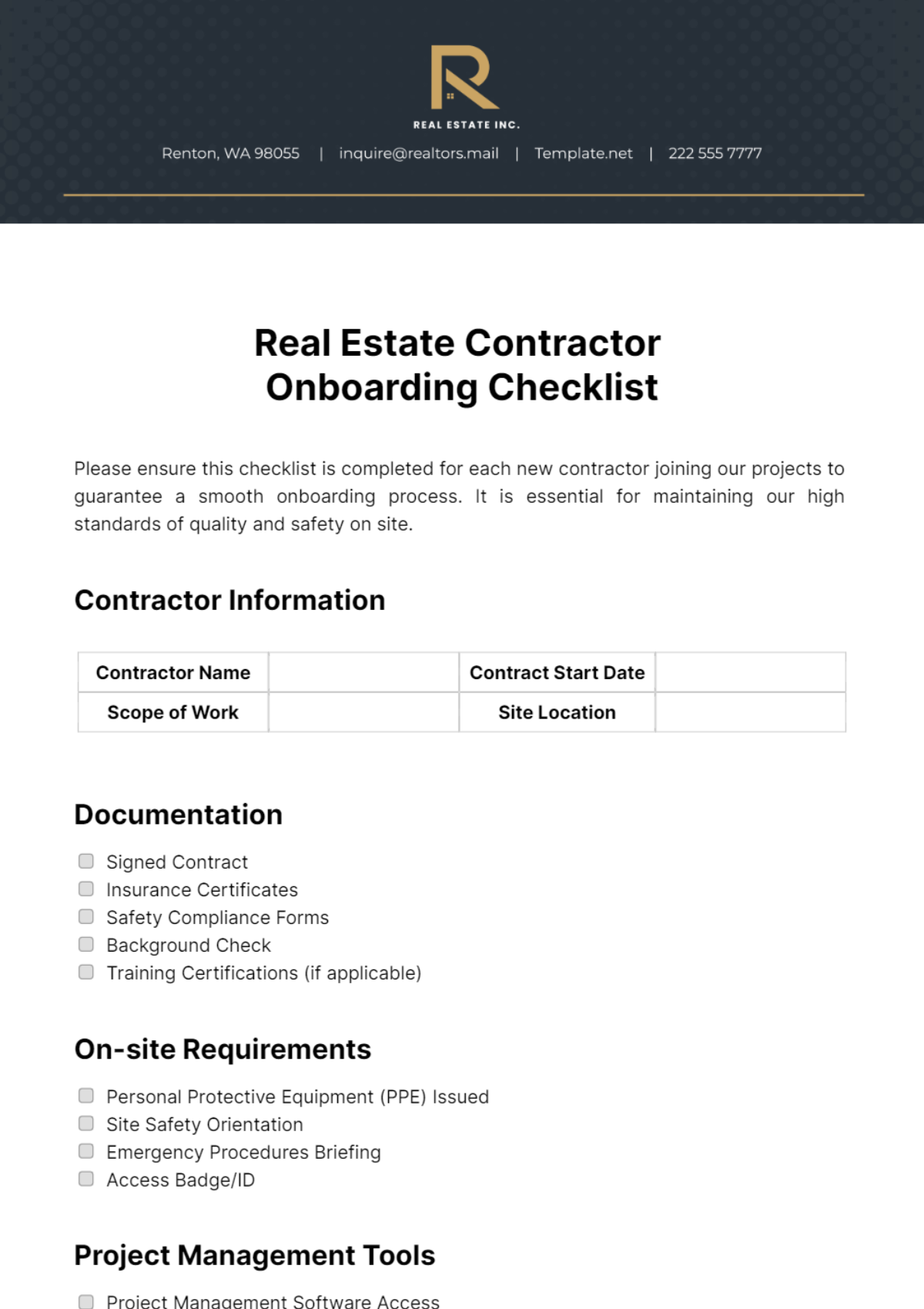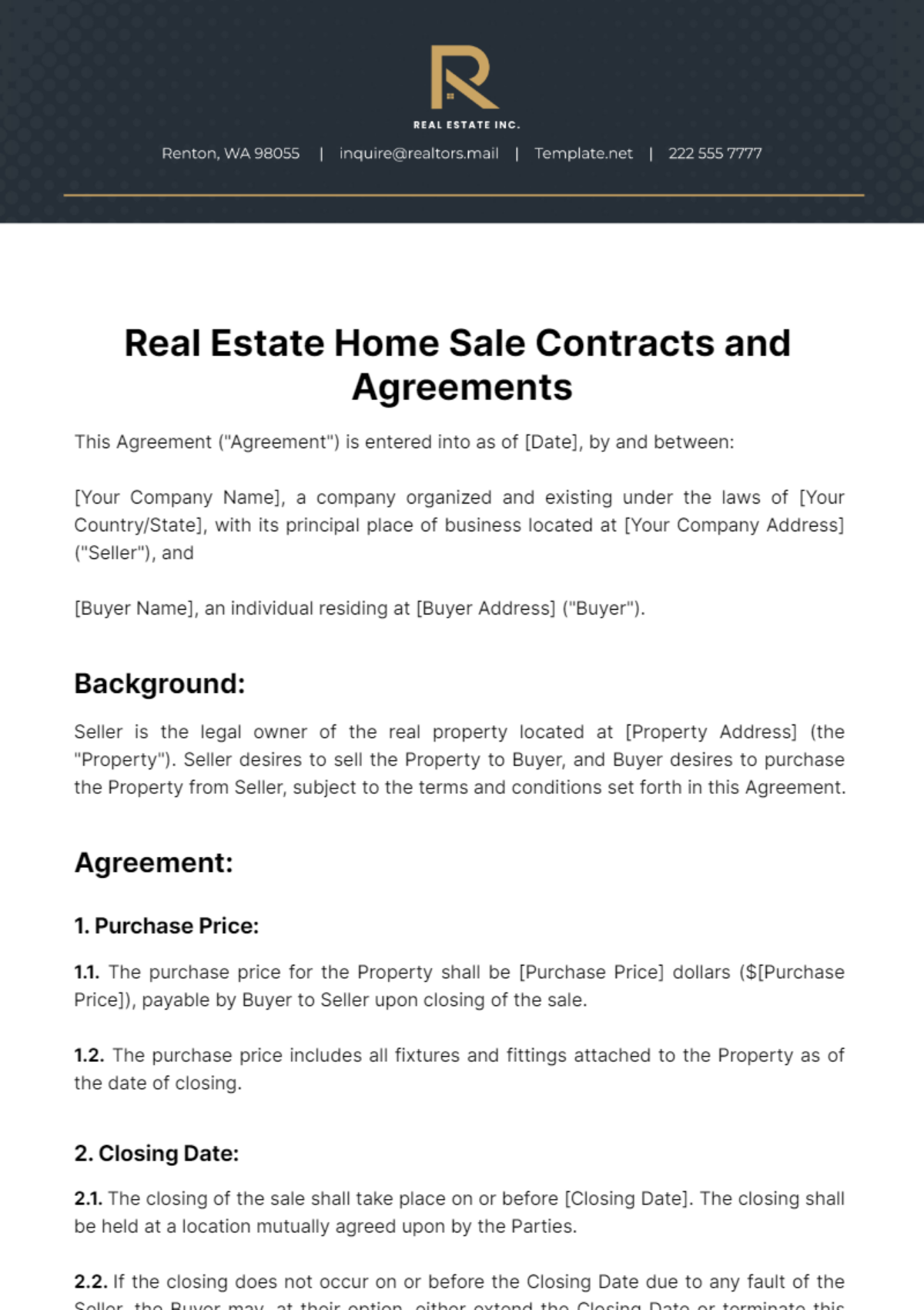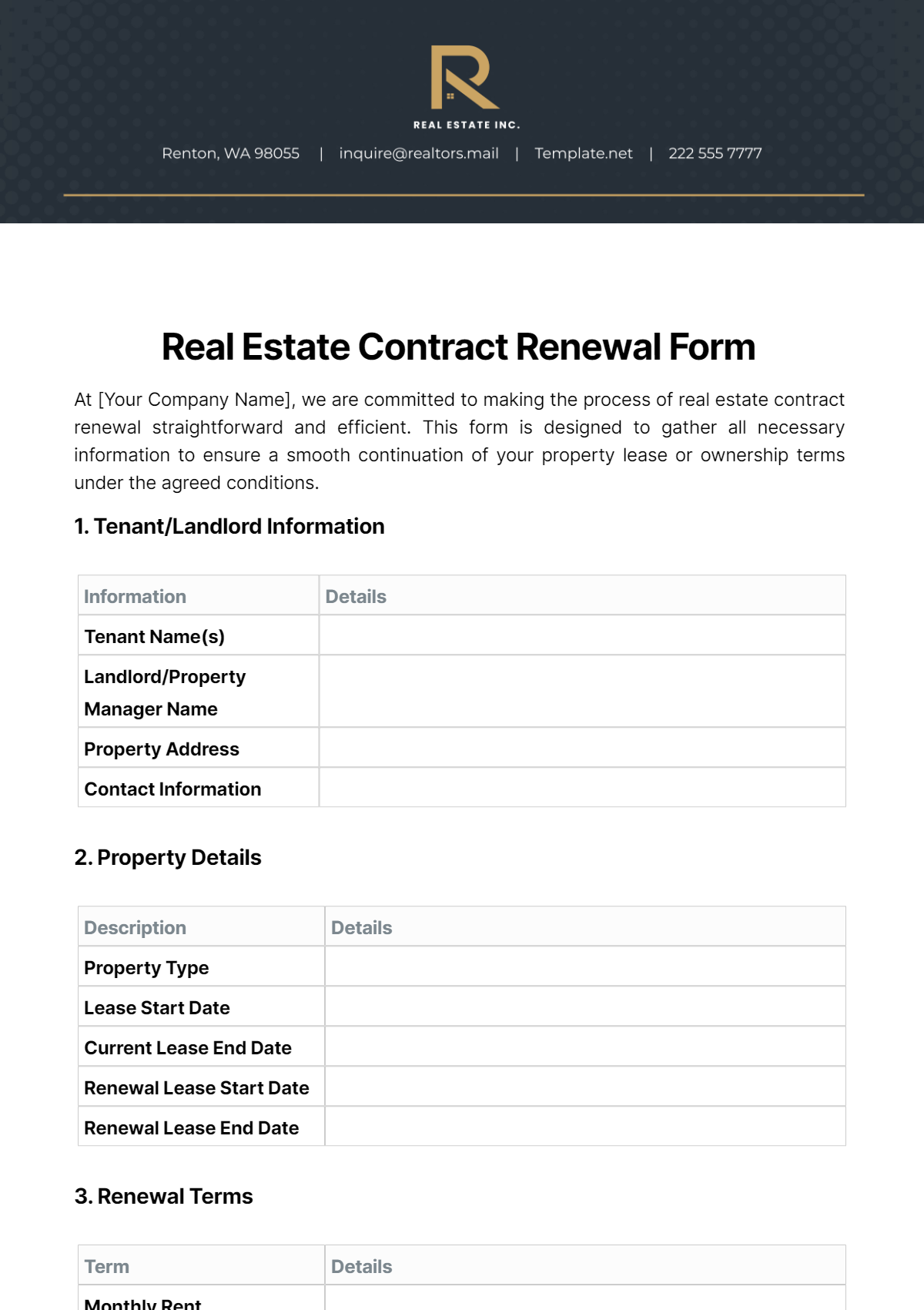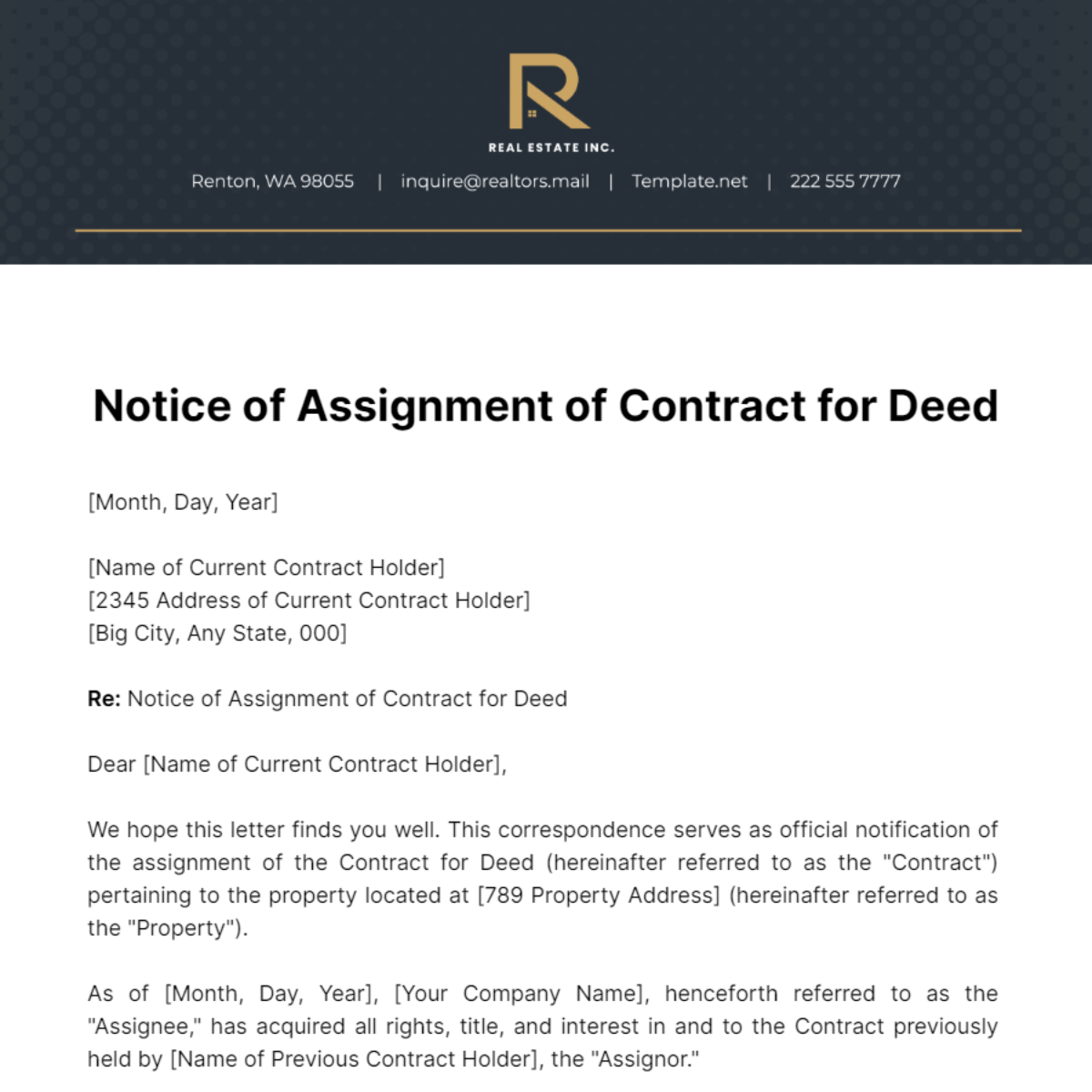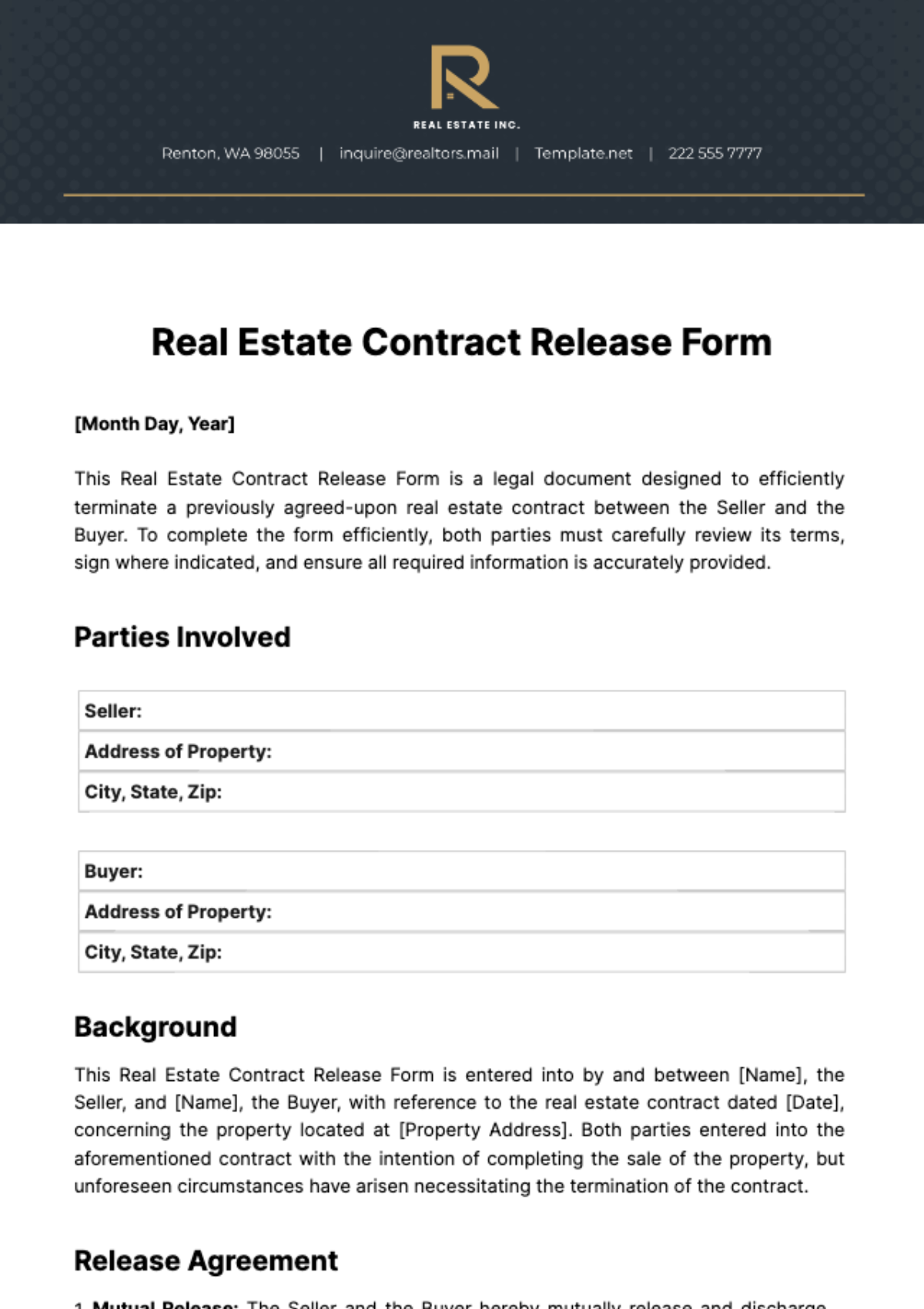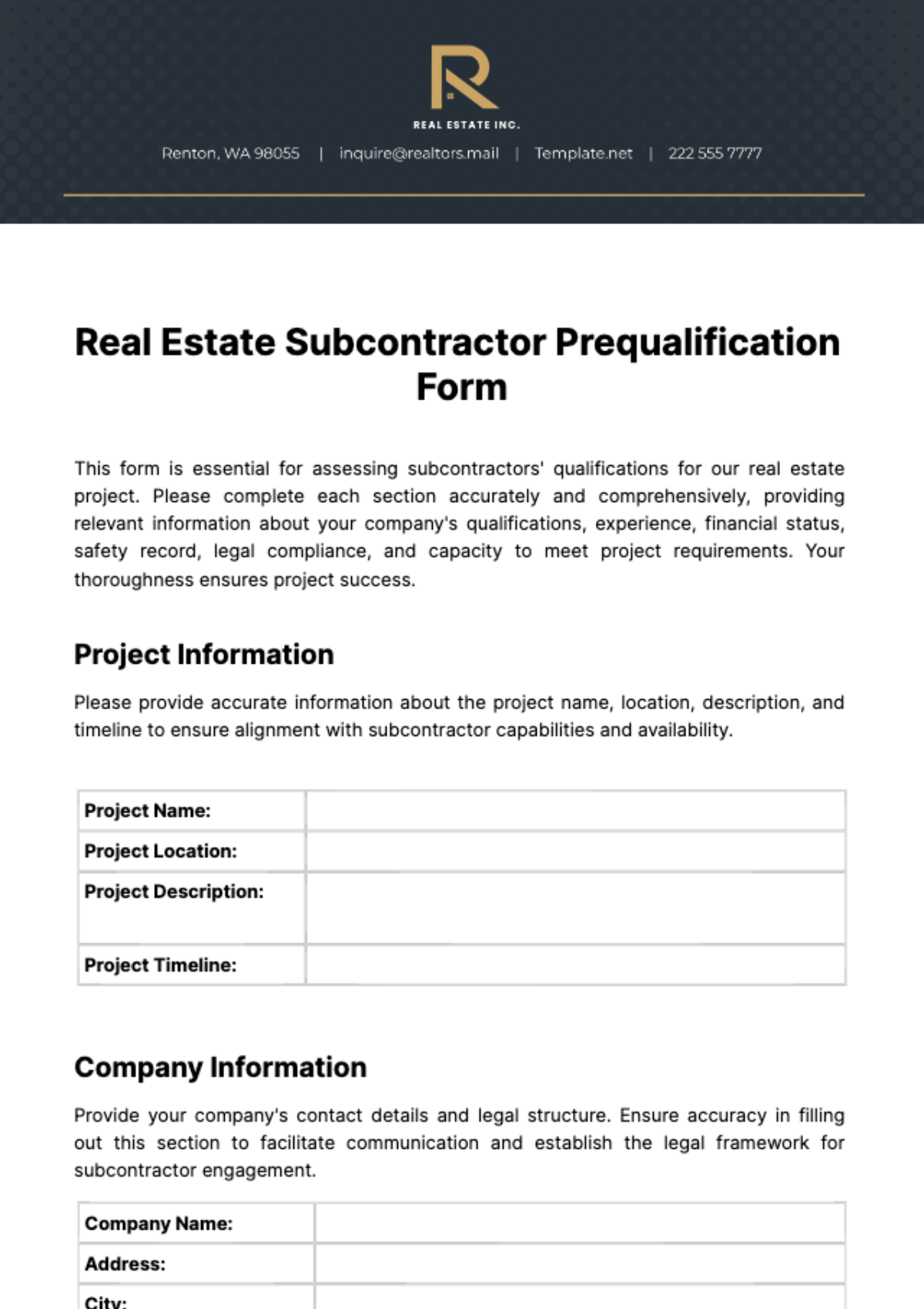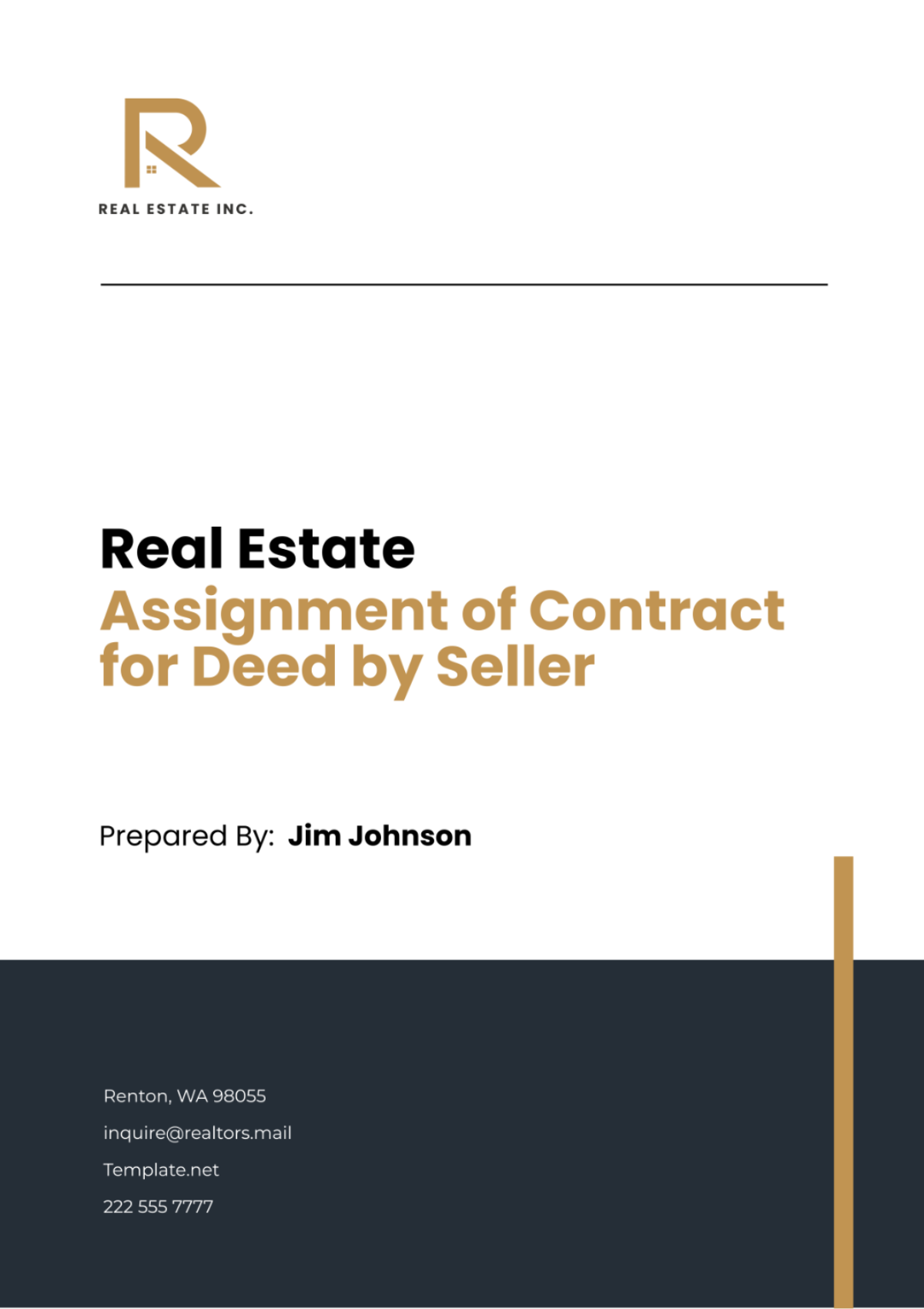Real Estate Assignment of Contract for Deed by Seller
I. The Parties
This Real Estate Assignment of Contract for Deed by Seller hereinafter referred to as the ("Contract") is entered into and effective this [Month Day, Year], by and between [Your Company Name] hereinafter referred to as the ("Assignor"), of [Your Company Address], and [Buyer's Name] hereinafter referred to as the ("Assignee"), of [Buyer's Address], collectively referred to as the “Parties.”
II. Recitals
The Parties acknowledge the following facts and circumstances:
A. Original Contract for Deed
WHEREAS, the Assignor entered into a Contract for Deed for the sale of certain real property located at [Property Address], as more fully described in the Contract for Deed. The Contract for Deed outlines the terms and conditions of the sale, including the purchase price, payment schedule, and other relevant details.
WHEREAS, the Assignor has fulfilled all their obligations under the Contract for Deed up to the date of this assignment. This includes making any required payments, maintaining the property, and complying with any other terms and conditions of the Contract for Deed.
WHEREAS, the Assignor has decided to assign their rights and obligations under the Contract for Deed to the Assignee for reasons that are mutually beneficial to both parties.
B. Assignment of Contract for Deed
WHEREAS, the Assignor wishes to assign all their rights, title, and interest in the Contract for Deed to the Assignee. This includes the right to receive future payments, the right to enforce the terms of the Contract for Deed, and any other rights granted by the Contract for Deed.
WHEREAS, the Assignee is willing to assume all the obligations of the Assignor under the Contract for Deed from the date of this assignment. This includes making any required payments, maintaining the property, and complying with any other terms and conditions of the Contract for Deed.
WHEREAS, the Assignee acknowledges that they are receiving a valuable asset in the form of the property and are therefore willing to assume the obligations of the Contract for Deed.
C. Agreement to Assign and Assume
WHEREAS, the Parties have agreed to the assignment and assumption of the Contract for Deed on the terms and conditions set forth in this Contract. This agreement is the result of careful negotiation and consideration by both parties.
WHEREAS, the Parties intend this Contract to be legally binding and enforceable according to its terms. This means that the Parties can rely on this Contract to protect their rights and interests.
WHEREAS, the Parties acknowledge that this Contract represents the entire agreement between them regarding the assignment and assumption of the Contract for Deed. This means that any previous agreements or understandings are superseded by this Contract.
NOW THEREFORE, in consideration of the mutual covenants contained herein and for other good and valuable consideration, the receipt and sufficiency of which is hereby acknowledged, the Parties agree as follows:
III. Agreement
For valuable consideration, the receipt and sufficiency of which is hereby acknowledged, Assignor agrees to sell, assign, transfer, and set over unto Assignee all of Assignor’s right, title and interest in, to and under the Contract for Deed:
A. Conditions of Assignment
Assignment Subject to Contract for Deed: This assignment is made subject to all terms and conditions contained in the Contract for Deed. This means that the Assignee will be bound by the same terms and conditions as the Assignor, and will assume all of the Assignor’s obligations under the Contract for Deed.
Assumption of Obligations: The Assignee also acknowledges that they are assuming all of the Assignor’s obligations under the Contract for Deed, including any obligations that are currently due or will become due in the future. This includes, but is not limited to, making all required payments, maintaining the property, and complying with any other terms and conditions of the Contract for Deed.
Provision of Necessary Documents: The Assignor will provide the Assignee with all necessary documents and information related to the Contract for Deed and the property. This includes, but is not limited to:
3.1. Contract for Deed: The Assignor will provide the Assignee with a copy of the Contract for Deed. This is the original agreement that outlines the terms and conditions for the sale of the property.
3.2. Amendments or Modifications: If there have been any amendments or modifications to the Contract for Deed, the Assignor will provide copies of these documents as well. This ensures that the Assignee is aware of any changes that have been made to the original agreement.
3.3. Property Records or Reports: The Assignor will provide any relevant property records or reports. This could include a property survey, a title report, inspection reports, or other similar documents.
3.4. Additional Documents: The Assignor will provide any other documents or information that may be necessary for the Assignee to assume the Contract for Deed. This could include financial records, tax documents, or other legal documents related to the property.
Assignor’s Responsibility: The Assignor will be responsible for any penalties or consequences resulting from a breach of the Contract for Deed up until the date of this assignment.
B. Payment Schedule
Total Sum: The Assignee agrees to pay a total sum of [$500,000] for the assigned Contract for Deed.
Payment Schedule: The payment schedule will be as follows: The Assignee will make an initial down payment of [$100,000] on the effective date of this assignment. The remaining balance of [$400,000] will be paid in [48] monthly installments of [$8,333.33], starting [1] month after the effective date of this assignment.
Consequences of Missed Payments: The Assignee understands that failure to make payments as scheduled may result in legal action by the Assignor, including but not limited to, termination of the Contract for Deed and forfeiture of any payments made.
Proof of Payment: The Assignee will provide the Assignor with proof of each payment made according to the payment schedule:
4.1. Provision of Proof: The Assignee will provide the Assignor with proof of each payment made according to the payment schedule. This ensures that there is a record of each payment, which can be useful for accounting and tax purposes.
4.2. Types of Proof: This proof may include bank statements, receipts, or other documentation showing that the payment was made. The type of proof required may depend on the payment method used.
4.3. Timing of Proof: The Assignee will provide the proof of payment promptly after each payment is made. This allows the Assignor to confirm receipt of the payment and update their records accordingly.
4.4. Disputes over Payment: If there is a dispute over whether a payment was made, the Assignee can use the proof of payment to demonstrate that they fulfilled their obligation.
Late Payment Penalties: The Assignee acknowledges that late payments may incur penalties:
5.1. Acknowledgement of Penalties: The Assignee acknowledges that late payments may incur penalties as outlined in the Contract for Deed. This means that if the Assignee fails to make a payment by the due date specified in the payment schedule, they may be required to pay additional fees or charges.
5.2. Penalty Amount: The amount of the late payment penalty will be [5] percentage of the overdue payment.
5.3. Impact on Contract: Repeated late payments could result in a default under the terms of the Contract for Deed, which could have serious consequences, including the potential loss of the property.
5.4. Cure Period: The Contract for Deed may provide a grace period or cure period after a payment due date, during which the Assignee can make the overdue payment without incurring a late payment penalty. The length of this period, if any, will be specified in the Contract for Deed.
5.5. Notification of Late Payment: If a payment is late, the Assignor will notify the Assignee in writing. The Assignee will then have the opportunity to make the overdue payment within the cure period, if applicable, to avoid a late payment penalty.
C. Representations and Warranties
Right and Authority to Assign: The Assignor represents and warrants to the Assignee that the Assignor has the full right and authority to assign the Contract for Deed and that there are no other persons with any rights in the Contract for Deed.
Validity of Contract for Deed: The Assignor further represents and warrants that the Contract for Deed is in full force and effect and has not been modified or amended, except as disclosed to the Assignee.
No Pending Legal Actions: The Assignor also represents and warrants that there are no legal actions, claims, or proceedings pending or threatened that could affect the Contract for Deed or the property.
D. Indemnification
Indemnification by Assignee: The Assignee agrees to indemnify, defend, and protect the Assignor from and against all losses resulting from any breach of any of the representations, warranties, and agreements of Assignee set forth in this agreement.
Scope of Indemnification: This indemnification includes, but is not limited to:
2.1. Failure to Make Payments: The indemnification includes any losses resulting from the Assignee’s failure to make payments as scheduled. If the Assignee misses a payment or makes a late payment, the Assignor could incur costs or losses. The Assignee agrees to reimburse the Assignor for these costs.
2.2. Failure to Maintain Property: The indemnification also includes any losses resulting from the Assignee’s failure to maintain the property. If the Assignee does not properly maintain the property, it could lead to a decrease in the property’s value or other damages. The Assignee agrees to reimburse the Assignor for any losses related to property maintenance.
2.3. Violation of Laws or Regulations: The indemnification further includes any losses resulting from the Assignee’s violation of any laws or regulations related to the property. This could include zoning laws, building codes, environmental regulations, or other similar laws or regulations. The Assignee agrees to reimburse the Assignor for any fines, penalties, or other costs resulting from such violations.
Survival of Indemnification: The Assignee’s obligation to indemnify the Assignor will survive the termination of this agreement. This means that the Assignee will continue to be responsible for any losses incurred by the Assignor due to the Assignee’s actions, even after the agreement has ended.
Notification of Claims: The Assignor will promptly notify the Assignee of any claim or liability that may give rise to a right of indemnification. This allows the Assignee to respond to the claim or liability in a timely manner.
E. Governing Law
Choice of Law: This assignment shall be governed and construed in accordance with the laws of [State Name]. This means that the laws of [State Name] will be used to interpret the terms of this agreement and to resolve any disputes that may arise.
Jurisdiction: The Parties agree that any legal action related to this assignment will be brought in the courts of [State Name]. This ensures that any disputes will be resolved in a consistent manner, according to the laws of [State Name].
Compliance with Local Laws: The Parties will comply with all applicable laws and regulations of [State Name] in performing their obligations under this agreement:
3.1. Obligation to Comply: The Parties will comply with all applicable laws and regulations of [State Name] in performing their obligations under this agreement. This includes, but is not limited to, laws related to real estate transactions, consumer protection, and data privacy.
3.2. Real Estate Laws: The Parties will comply with all laws and regulations related to the sale and purchase of real estate. This includes laws related to property disclosures, inspections, and title transfers.
3.3. Consumer Protection Laws: The Parties will comply with all laws and regulations designed to protect consumers. This includes laws related to fair lending, truth in advertising, and data privacy.
3.4. Data Privacy Laws: The Parties will comply with all laws and regulations related to data privacy. This includes laws related to the collection, storage, and sharing of personal information.
3.5. Penalties for Non-Compliance: The Parties understand that failure to comply with these laws and regulations could result in penalties, including fines, injunctions, and potentially the invalidation of this agreement.
F. Binding Effect
Binding upon Successors and Assigns: This agreement shall be binding upon and shall inure to the benefit of the Assignor and Assignee and their respective heirs, executors, administrators, successors and assigns. This means that the rights and obligations of the Parties under this agreement will continue to apply even if the Contract for Deed or the property is transferred to another person or entity.
No Assignment without Consent: The Assignor and Assignee may not assign their rights or obligations under this agreement without the prior written consent of the other party. This ensures that the Parties have control over who may assume their rights and obligations under this agreement.
Enforceability
3.1. Validity of Provisions: If any provision of this agreement is found to be unenforceable, the remaining provisions will continue in full force and effect. This ensures that the agreement remains effective even if part of it is found to be invalid.
3.2. Severability: Each provision in this agreement stands on its own. If a court of competent jurisdiction finds any provision of this agreement to be invalid or unenforceable, that provision will be modified or severed, but the rest of the agreement will remain in effect.
3.3. Modification: If necessary, the invalid or unenforceable provision may be modified to the extent necessary to make it valid and enforceable, while preserving its intent and the overall intent of the agreement.
3.4. Continued Effect: The rest of the agreement will continue to be binding and enforceable, preserving the rights and obligations of the Parties as much as possible.
Entire Agreement
4.1. Supersedes Previous Agreements: This agreement, along with any exhibits or attachments, constitutes the entire agreement between the Parties with respect to the subject matter of this agreement. This means that any previous agreements or understandings are superseded by this agreement.
4.2. Written Agreement: This agreement is a written document that captures all the terms and conditions agreed upon by the Parties. It supersedes any prior oral or written agreements or understandings between the Parties.
4.3. Exhibits and Attachments: Any exhibits or attachments to this agreement are considered part of the agreement. They provide additional details or specifications that are important to the agreement.
4.4. No Other Agreements: There are no other agreements or understandings between the Parties that are not captured in this agreement. Any other agreements or understandings are not valid unless they are added to this agreement in a formal amendment
Amendments
5.1. Written Amendments: Any amendments to this agreement must be in writing and signed by both Parties. This ensures that any changes to the agreement are clearly documented and agreed upon by both Parties.
5.2. Mutual Agreement: Any changes to this agreement must be agreed upon by both Parties. One party cannot unilaterally change the agreement.
5.3. Signed by Both Parties: The amendment must be signed by both Parties to show their consent to the changes. Electronic signatures are acceptable if permitted by law.
5.4. Form of Amendment: The amendment should clearly state what parts of the agreement are being changed and how. It should be as clear and specific as possible to avoid any misunderstandings.
IV. Signatures
IN WITNESS WHEREOF, the parties hereto have executed this Agreement as of the date first above written.
Assignor

[Authorized Representative Name]
[Your Company Name]
Date: [Month Day, Year]
Assignee

[Assignee's Name]
Date: [Month Day, Year]


